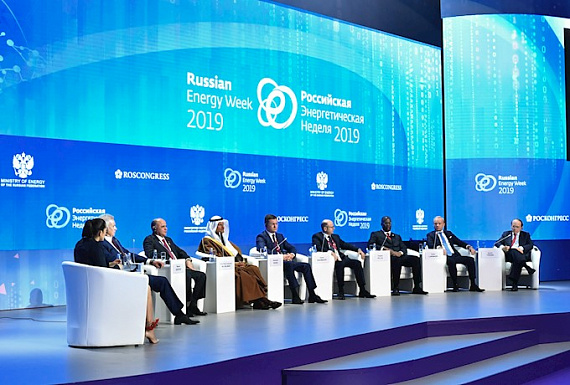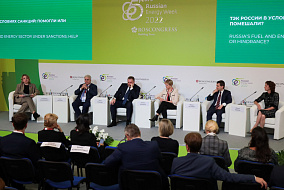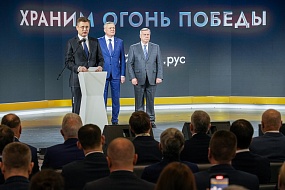October 3, 2019

Oil Demand Discussed by the Speakers of the Session ‘Maintaining Energy Connectivity in an Unstable World’

At the plenary session Maintaining Energy Connectivity in an Unstable World at the Russian Energy Week global problems in the oil market were discussed that affect all countries. According to industry experts, the past year saw the emergence of several challenges for the oil market, but they were overcome thanks in part to cooperation under the OPEC+ agreement.
According to Alexander Novak, Minister of Energy of the Russian Federation, today oil is the number one commodity in the market and is an indicator of the fluctuations that are taking place in the global economy and oil market and is very responsive to global news stories. “When talking about oil prices and supply and demand we should look ahead in the medium and long term. This year various factors are driving down demand growth for oil. The increase this year will be 1–1.1 million barrels per day, while last year growth hit 1.5 million barrels per day. The key factor driving these changes is the slowdown in the economies of the US, EU, and China as a result of the trade wars and mutual introduction of tariffs imports,” he said.
At the same time, Alexander Novak highlighted the stability of the market and its low volatility. He believes that this is in part a result of cooperation with OPEC. “There has been a fall in the balances that were accumulated by 2015 and investment has returned to the industry, which fell by USD 1 trillion during the recession,” he said.
Speaking about the global challenges facing oil exporting countries, Prince Abdulaziz bin Salman bin Abdulaziz Al Saud, Minister of Energy, Industry and Mineral Resources of the Kingdom of Saudi Arabia spoke about the repair work following the drone attacks that set two major oil facilities ablaze. “Never before anywhere in the world has production fallen instantaneously by 50% and the reputation of a reliable supplier put under threat like this. After all, we are responsible for 5% of the world's oil production. We have dealt with this situation and are ready to move on. Now production volumes have stabilized, and by the end of November they will return to previous levels. We have made these commitments and will stick to them,” he said. “There is no need to focus on negative expectations, we need to move on and find solutions to the trade wars. Demand is falling, but be aware that supply may be lower, so the supply forecast is no less important for the market.” Abdulaziz bin Salman spoke about the work underway to create an energy sector ecosystem, the country’s involvement in the development of renewable energy sources, and measures being taken to address energy efficiency issues. “We work with all types of fuel, because today we need to focus on the production of clean energy. It doesn’t matter which energy source we use, the whole world needs to come together on this,” he said.
The problem of attacks on energy facilities was raised by Manuel Quevedo, the Minister of People's Power of Petroleum of the Bolivarian Republic of Venezuela; President, Petróleos de Venezuela. “Until recently, we were reliable partners for all markets, but this level of confidence has been undermined to such an extent that the threat has emerged of the Venezuelan economy being strangled. We have suffered attacks on the country's electrical system in order to paralyze production. But we are working with our strategic partners and will return to our previous level of production,” he said. Manuel Quevedo believes that the energy market should not be used as a tool to attack the world's economies. The oil and gas market should be used for the development of countries and their peoples. “Global leaders must take responsibility to ensure that energy resources are used for development in any scenario. When such attacks occur, it is not just the particular industry that suffers, but ordinary people. Global energy resources should be used as an instrument of development, with people at its centre. Oil and gas are not and should not be a tool of war,” he said.
Parviz Shahbazov, Minister of Energy of the Republic of Azerbaijan said that the key goal of OPEC+ has been fulfilled and stability has been ensured in today’s global oil market.
Vagit Alekperov, President, Executive Member of the Board of Directors, Chairman of the Management Committee, LUKOIL, said that under the terms of the OPEC+ agreement, energy companies should enhance their technological capabilities. “7% of the company’s headcount today is research staff working on technologies and solutions that will be in demand in 30 years. Oil and gas are not renewable sources of energy, and we must take a proactive stance for industry efforts to satisfy the growing demand for oil and gas. We have 500 patents on the company's balance sheet that are being introduced into the economy and our industry. I hope that this will allow us to achieve stable production volumes even after 2030,” he said. “There is no clear definition of an oil or gas company; today most companies are energy companies. At the same time, the world’s population is growing, and consumption is growing accordingly. So, our main goal is to satisfy mankind’s demand for energy.”
In turn, Timipre Sylva, Minister of State and Petroleum Resources, Federal Republic of Nigeria, spoke about the need for cooperation and support from African countries to address the problem of energy shortages. “Today I speak on behalf of all of Africa. We understand the importance of talking about renewable energy. But sometimes we feel like the world is moving too fast, the goals keep changing and we cannot always keep up with them. Now we have achieved a certain level of stability, we are transitioning to the more active use of gas, but the whole world has already taken the next step. And we want to move on with you. We also support the implementation of the Paris Climate Agreement, but the reality is that we have not reached that required degree of economic maturity in order to participate in a full-fledged discussion on renewable energy sources. The world should look at Africa differently. We need to overcome the issue of energy poverty in Africa, then focus on supporting the African continent and helping it reach the stage of development that the world has reached so quickly,” he said.
The organizers of Russian Energy Week are the Ministry of Energy of the Russian Federation and the Roscongress Foundation with the support of the Moscow Government.





